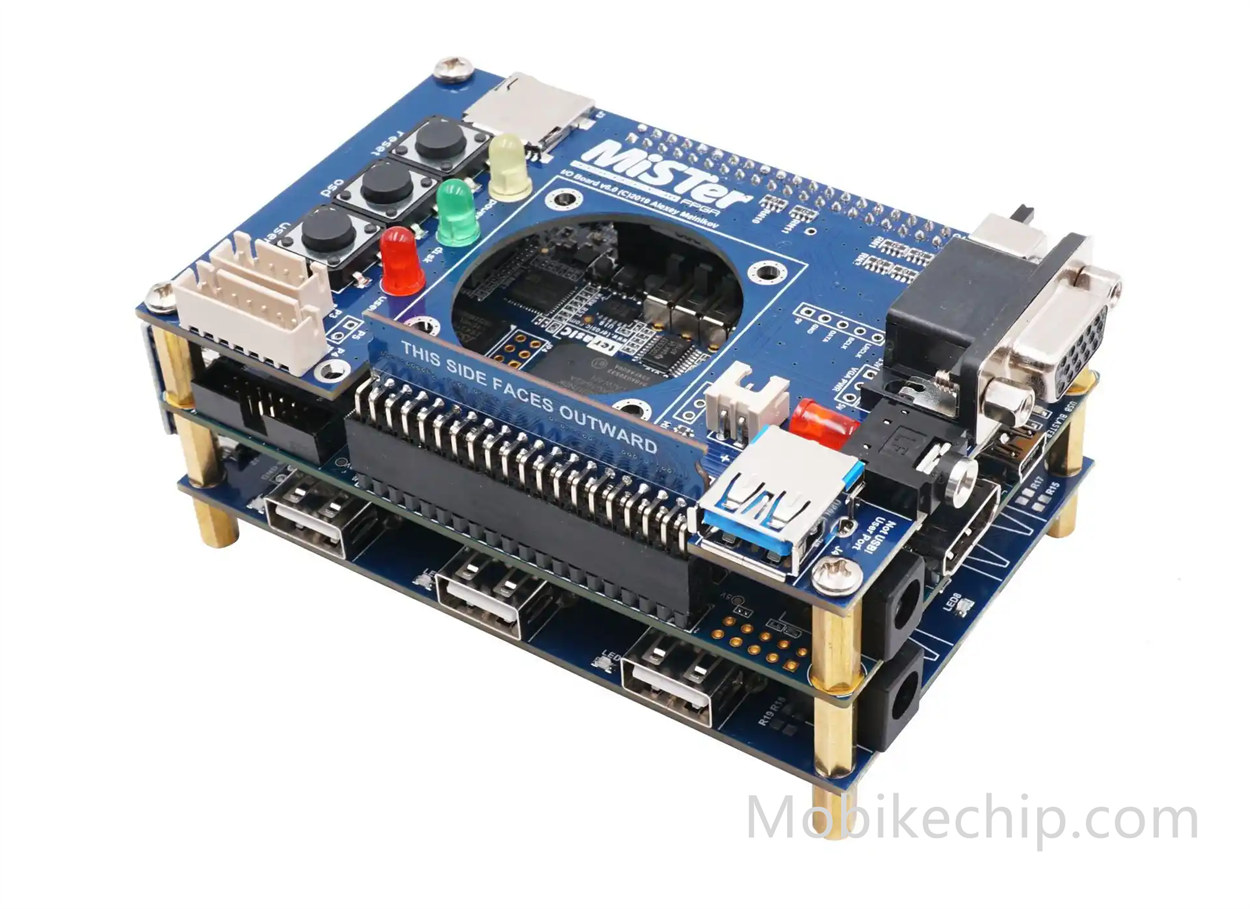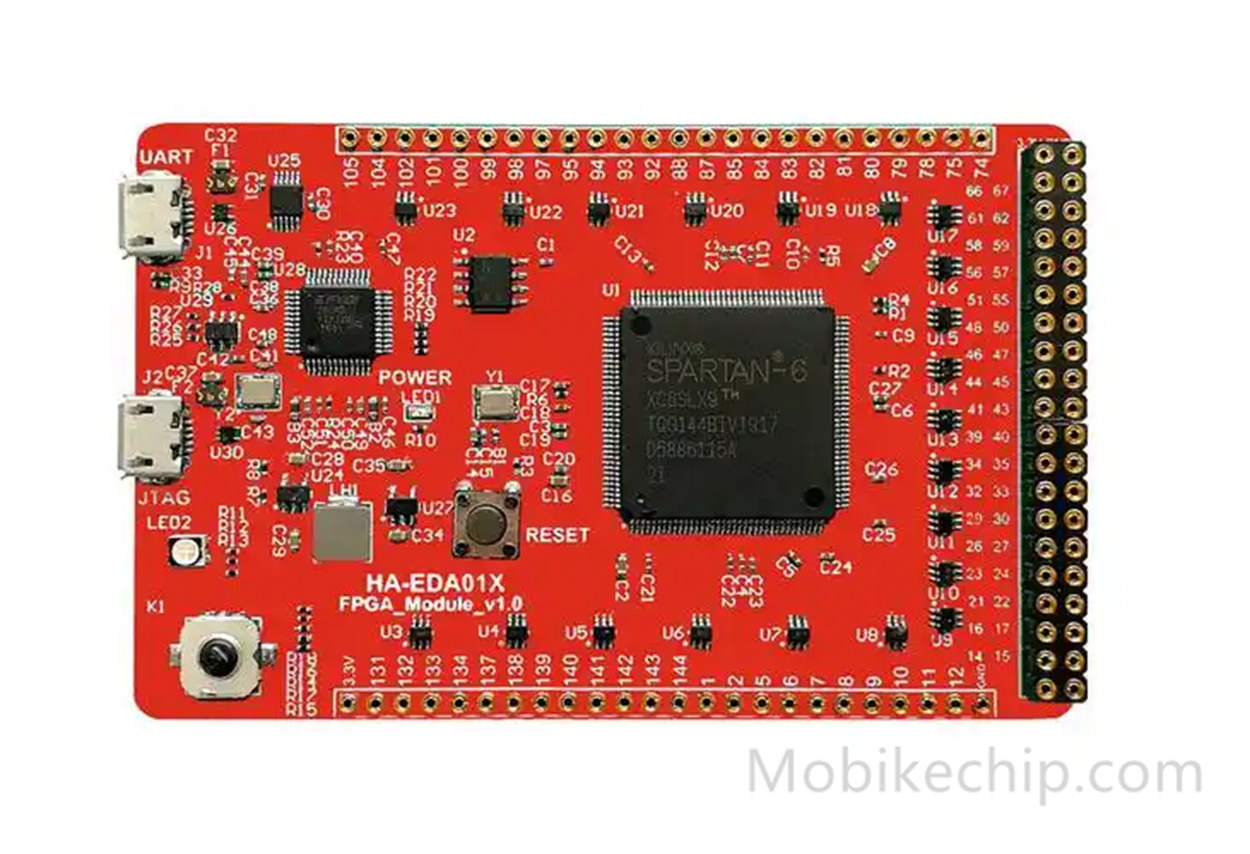FPGA Modules: Revolutionizing Electronics with Customizable Logic
Field-Programmable Gate Arrays (FPGAs) have become a transformative force in modern electronics, enabling flexible and powerful solutions across a wide range of applications. The heart of an FPGA is its ability to be programmed and reprogrammed to perform specific logic functions, allowing it to adapt to various tasks and systems. As industries continue to demand more powerful, efficient, and customizable solutions, FPGA modules are proving to be a key enabler in fields such as telecommunications, automotive, aerospace, and industrial automation.
In this article, we’ll explore the technical principles of FPGA modules, their unique features, and the applications that have made them indispensable in modern electronics.

What Are FPGA Modules?
An FPGA (Field-Programmable Gate Array) is an integrated circuit that contains an array of programmable logic blocks, which can be configured to implement virtually any digital logic function. Unlike traditional fixed-function chips, FPGAs allow users to configure and reconfigure the hardware based on their specific requirements, making them highly versatile.
An FPGA module is essentially an FPGA chip that is integrated with other supporting components and connectors, providing a complete solution for specific applications. These modules often include memory, input/output interfaces, and clocking circuits, all designed to work together seamlessly. FPGA modules allow users to leverage the power of FPGAs without needing to design a custom PCB or manage complex hardware integration themselves.
How Do FPGA Modules Work?
At the core of FPGA technology is the concept of programmable logic. The FPGA consists of an array of logic blocks that can be configured to perform various functions such as AND gates, OR gates, flip-flops, multiplexers, and more. These logic blocks are interconnected by a network of programmable interconnects, which allow the blocks to communicate with each other.
Programming the FPGA
Programming an FPGA involves writing a hardware description, usually in HDL (Hardware Description Language) such as VHDL or Verilog, to define the logic functions the FPGA will perform. Once the logic is designed, it is synthesized into a configuration bitstream that is uploaded to the FPGA. The bitstream configures the programmable blocks and interconnections, turning the FPGA into a custom digital circuit capable of executing the desired tasks.
Reconfigurability
One of the key features of FPGA modules is reconfigurability. Unlike traditional Application-Specific Integrated Circuits (ASICs), which are hardwired to perform a single function, FPGAs can be reprogrammed to perform different tasks as needed. This flexibility allows designers to rapidly prototype designs, make iterative changes, and optimize performance without the need for new hardware.
Types of FPGA Modules
FPGA modules come in a variety of types, each designed to address specific needs in terms of processing power, connectivity, and application-specific features. Some of the most common types include:
1. General-Purpose FPGA Modules
These modules are designed to be flexible and support a broad range of applications. They feature standard I/O interfaces and are commonly used in development and prototyping. These modules are well-suited for a variety of industries, including telecommunications, robotics, and automotive.
- Applications: Prototyping new designs, educational use, general-purpose computing tasks, and embedded systems.
2. High-Performance FPGA Modules
These modules are optimized for high-speed processing and large-scale data handling. They typically feature multiple processing cores, high-bandwidth memory interfaces, and high-speed transceivers for demanding tasks such as signal processing, video processing, and data acquisition.
- Applications: High-frequency trading, real-time signal processing, advanced image and video analysis, scientific research, and telecommunications.
3. Specialized FPGA Modules

Specialized FPGA modules are designed for specific industries or applications. These might include custom networking, signal processing, or communications modules with built-in support for protocols such as Ethernet, PCIe, or USB. These modules often feature additional components such as dedicated DSP blocks, analog-to-digital converters (ADCs), or digital-to-analog converters (DACs) to support specialized tasks.
- Applications: Network infrastructure, wireless communications, medical devices, and defense systems.
4. SoC FPGA Modules (System-on-Chip)
SoC FPGA modules combine the power of traditional FPGAs with embedded processors such as ARM cores. These modules offer both programmable logic and general-purpose processing in a single chip, making them ideal for applications that require both flexible hardware logic and software-based control. The integration of a processor with FPGA logic creates a powerful platform for system-level designs.
- Applications: Embedded systems, robotics, industrial automation, automotive, and IoT.
Key Advantages of FPGA Modules
FPGA modules offer several significant advantages that make them a preferred choice in a variety of applications:
1. Flexibility and Reconfigurability
The most obvious benefit of FPGA modules is their flexibility. Unlike fixed-function chips, FPGAs can be reprogrammed to suit changing needs or requirements. This makes them ideal for prototyping, testing, and iterative design processes, where quick changes are necessary.
2. Parallel Processing Power
FPGAs can perform parallel processing, meaning multiple tasks can be executed simultaneously. This is a significant advantage over traditional microprocessors, which generally process instructions sequentially. The ability to process many operations at once enables FPGAs to achieve high levels of performance for tasks such as signal processing, cryptography, and data analysis.
3. Low Latency and High-Speed Processing
Because FPGAs can be customized to perform specific tasks in hardware, they offer very low latency and can achieve high speeds, especially in real-time processing applications. This makes them a popular choice in fields such as telecommunications, video streaming, and high-frequency trading, where timing is critical.
4. Cost-Effective for Low-to-Mid Volume Production
While ASICs offer high performance and efficiency for high-volume production, FPGAs can often provide a cost-effective solution for low-to-mid volume production runs. This makes them an excellent choice for custom applications or prototypes, where the cost of designing a custom ASIC may not be justified.

Applications of FPGA Modules
FPGA modules are used in a wide variety of applications across diverse industries. Below are some of the most prominent use cases:
1. Telecommunications and Networking
In telecommunications, FPGA modules are used to implement custom protocols, signal processing, and data routing. Their ability to handle high-speed data transfer makes them essential for tasks such as 4G/5G networks, fiber-optic communications, and network switching.
- Example: FPGAs are used in base stations and routers to process incoming and outgoing signals and manage network traffic.
2. Signal Processing and Audio/Video Applications
FPGAs excel in real-time signal processing and are widely used in audio and video processing applications. From image compression to video streaming and radar signal processing, FPGA modules handle the intensive computational tasks that would otherwise overwhelm traditional CPUs.
- Example: FPGAs are used in broadcasting equipment to process video signals, encode/decoding tasks, and manage high-definition video feeds in real-time.
3. Automotive and Aerospace
In automotive and aerospace applications, FPGA modules are used for tasks that require high performance, reliability, and real-time operation. They are deployed in systems like autonomous driving, radar systems, flight control systems, and navigation systems.
- Example: FPGA modules are used in autonomous vehicles to process data from sensors like LIDAR and cameras in real-time, enabling the vehicle to make decisions quickly.
4. Industrial Automation and IoT
FPGA modules are also widely used in industrial automation and IoT devices, where they enable real-time data processing, system control, and signal analysis. The ability to quickly adapt to new tasks makes FPGAs an ideal solution for production lines, robotics, and sensor-based systems.
- Example: In robotics, FPGA modules control motion systems and process data from various sensors to ensure precise and accurate actions.
Why Choose MobikeChip for Your FPGA Modules?
At MobikeChip, we offer a wide selection of high-quality FPGA modules for all your custom logic design needs. Our extensive portfolio includes modules from leading manufacturers that provide the flexibility, performance, and reliability required for your projects. Whether you're developing a wireless communication system, automotive electronics, or industrial automation, we have the right FPGA module for your application.
With competitive pricing, fast shipping, and excellent customer service, MobikeChip is your trusted partner for FPGA modules and other essential electronic components. Explore our catalog today and take your designs to the next level with our powerful and customizable FPGA solutions.
Conclusion
FPGA modules are versatile and powerful components that enable customizable hardware solutions for a variety of applications. With their ability to be reprogrammed and their support for parallel processing, FPGAs have become an essential tool in fields such as telecommunications, signal processing, automotive, and industrial automation. By offering unparalleled flexibility, performance, and cost-effectiveness, FPGA modules continue to play a pivotal role in shaping the future of electronics.
About Us
MobikeChip offers a broad range of genuine electronic components from over 2,600 manufacturers at competitive prices. Our product portfolio includes Integrated Circuits (ICs), Discrete Semiconductor Products, Resistors, Capacitors, Relays, Switches, Transformers, Sensors, Transducers, Inductors, Coils, Chokes, Potentiometers, Variable Resistors, Crystals, Thermal Management products, and more.
Category page: FPGAs (Field Programmable Gate Array)-Embedded-Manufacturers-Dealer-MobikeChip
Reprinted from: https://www.mobikechip.com/static-blog-detail/177.html
Comments
Post a Comment